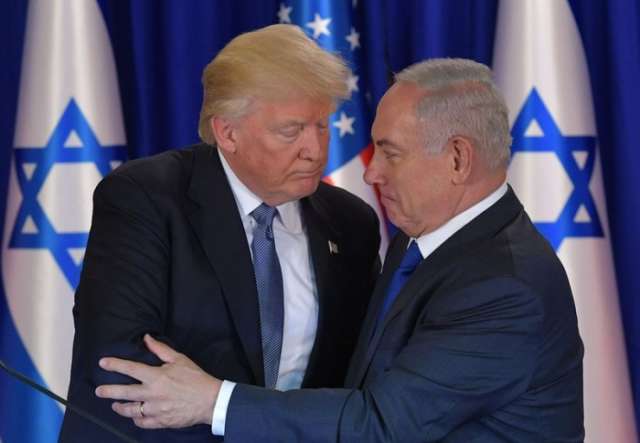It’s far from a fully-formed plan, and so far Trump has made his case only to friendly audiences: Sunni Arab nations like Saudi Arabia and Israeli Prime Minister Benjamin Netanyahu, all of whom fell over themselves praising the U.S. president. Palestinian Authority President Mahmoud Abbas welcomed Trump’s efforts on Tuesday, reiterating long-standing Palestinian demands for peace: an independent state with eastern Jerusalem as its capital. He also said Palestinians have no problem with the Jewish faith but with occupation and settlement construction in the West Bank.
Trump, standing next to Abbas, said he believes that if Israel and the Palestinians can make peace, “it will begin a process of peace throughout the Middle East, and that will be an amazing accomplishment.” He didn’t mention a Palestinian state, however, and noted that “peace can never take root in an environment where violence is tolerated, funded or rewarded” -- a seeming nod to the Israeli demand that the Palestinians stop paying stipends to those who attack Israelis.
Trump’s efforts to isolate Iran will face greater skepticism among European allies such as Germany’s Angela Merkel and France’s Emmanuel Macron. They don’t regard Iran in such apocalyptic terms and would like to restart robust trade with the Islamic Republic.
But after Barack Obama turned his attention away from the Mideast peace process toward the end of his second term, Trump and his pro-Israel administration have shown early signs of giving it another try.
Soon after taking office, Trump dispatched an envoy, Jason Greenblatt, to the region to meet with both Israelis and Palestinians. He has carefully avoided antagonizing the Palestinians, ignoring a campaign pledge to move the U.S. embassy in Israel to Jerusalem. He’s also urged Israel to slow the expansion of Jewish settlements in the West Bank, surprising both settlement supporters and opponents.
‘Eternal Capital’
In statements after their meeting in Jerusalem on Monday, Netanyahu emphasized the importance of the city to Jews, calling it Israel’s “eternal capital” and the “united capital of the Jewish state.” Trump was the first sitting U.S. president to visit the Western Wall, but pointedly said nothing about the city, which is also claimed by Palestinians and isn’t recognized internationally as Israel’s capital.
A succession of U.S. presidents have attempted to negotiate peace between Israel and the Palestinians, whose modern-day conflict dates to the 1948 establishment of the Jewish state, and all have failed. Trump hasn’t even begun to wade into the details of the peace process, which would entail negotiating a series of issues of land, faith and race with roots centuries old.
It remains unclear how Trump sees a path to peace emerging from a common interest among Israelis and Arabs in confronting Iran.
Aaron David Miller, a former U.S. Middle East peace negotiator and vice president at the Wilson Center in Washington, said in a phone interview that he doesn’t expect Trump will be able to “cut the ultimate deal” -- a final agreement to end the conflict.
“I see no chance of that,” he said, largely because neither Netanyahu nor Abbas has shown a willingness to make concessions on issues such as borders, Jerusalem and Palestinian refugees.
“However, whether by circumstance or by design, there are new factors that are realigning the traditional equation of the impasse,” Miller said.
Warmer Relations
Trump’s negotiating team, led by Greenblatt, is trying to exploit its close relations with both the Saudis and the Israelis to help broker better ties, in exchange for progress toward peace with the Palestinians. The idea isn’t entirely new: In 2002, the Arab League offered normalized relations with Israel in exchange for a full withdrawal from territories Israel won in the 1967 Middle East War. Then-Israeli Prime Minister Ariel Sharon rejected the proposal, which also hinted at a “right of return” for Palestinian refugees.
Now, antagonism toward Iran is injecting urgency into regional discussions. One idea being floated is for increased commercial ties and Israeli overflight rights through Saudi Arabia in exchange for Israeli concessions to the Palestinians and a freeze of settlement construction, according to an Israeli government official.
On Monday, Air Force One flew directly from Riyadh to Ben Gurion International Airport in Israel, believed to be a first as the two countries do not have diplomatic relations.
“President Trump’s visit strengthens the anti-Iranian camp in the region and presents an opportunity to advance regional security and economic cooperation as a foundation for regional peace,” Intelligence Minister Israel Katz said. He has met with Greenblatt recently, pushing a proposal for a train track connecting Israel and Saudi Arabia to bolster commercial ties.
Shuttle Diplomacy
Greenblatt, an Orthodox Jew, has shuttled among Riyadh, Ramallah and Jerusalem as he seeks to find common understandings and jump-start the peace process. But many of the obstacles that have kept Israel and the Gulf countries from strengthening ties publicly may hinder Trump’s efforts as well.
Netanyahu had a hard time getting his hawkish Cabinet to pass relatively simple gestures toward the Palestinians ahead of Trump’s visit, and bigger concessions could jeopardize his coalition. Arab countries are reluctant to take any public steps toward normalization with Israel due to widespread resentment of the Jewish state among their publics.
Yousef Munayyer, a resident scholar at the Middle East Institute and executive director of the U.S. Campaign for Palestinian Rights, said he doubts Trump will succeed at making peace. But the president who campaigned on a pledge to put “America First” is showing a surprising interest in a region far from his homeland, he said.
“The big message from his trip to Israel is that Trump is going to be quite different than advertised,” he said. “I don’t think he’s going to be able to make a deal. That doesn’t mean the time he spends working on it may not shake things up.”
Margaret Talev is White House correspondent for Bloomberg News.
More about: #DonaldTrump #Israel #SaudiArabia
















































